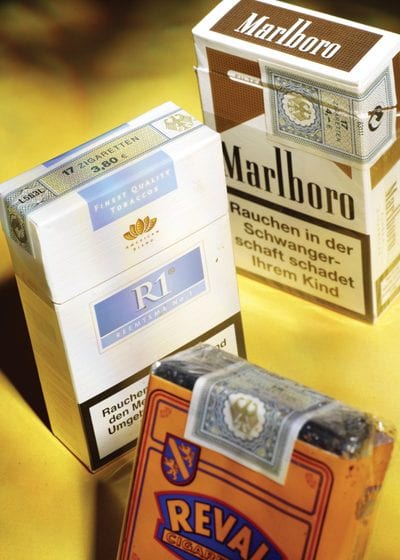British American Tobacco Kenya has said further increases in excise duty could put its products out of consumers’ reach and deal a hard blow to its profitability, according to a story in The Business Daily.
BAT Kenya, which on Friday reported a 21.2 percent drop in net profit to Sh3.3 billion, said unpredictable tax increases were a threat to its Kenya business.
“We would encourage the government to have a much more stable tax environment so that their revenues can be more predictable and we can have a more predictable operating environment,” BAT Kenya MD Beverly Spencer-Obatoyinbo said at a media briefing.
“Smaller increases in specific excise rates are easier for us to manage and easier for the consumer to handle and will give consistent revenue gains for the government.”
Tobacco control advocates claim that cigarette tax is too low, and they have been urging the government to raise it from the current Sh2.50 per piece to Sh3.25 per piece.
“Currently, the average growth in the nominal price of a pack of cigarettes is lower than that of kerosene and food, and therefore cigarette smoking is going up,” said Rodgers Kidiya, program officer in charge of research and development at the Nairobi-based International Institute for Legislative Affairs.
The tax-increase proposal, Kidiya said, was based on a predictive model that took into account inflation to show the future prices of products.
The current tobacco excise tax regime was instituted in 2015, but in March last year Treasury Secretary Henry Rotich provided relief to smokers of low-end cigarettes with a cut in excise tax that saw the price of non-filter cigarettes fall by 70 cents.
Rotich split the tax structure for cigarettes keeping it at Sh2.50 per piece for cigarettes with filters and introducing a new rate of Sh1.80 for those without.
The two types of cigarettes had been attracting a uniform tax of Sh2.50 per piece.
Tag: Kenya

Taxing problems in Kenya
Ban has a silver lining
Kenya’s ban on shisha has opened up further opportunities for sales of electronic cigarettes, according to a story in Citizen Digital.
Now more than ever, electronic cigarettes and vaping are being popularized in Kenya as netizens share their vaping videos on social media.
Speaking to Citizen Digital, a Kenyan vape retailer reportedly said that e-cigarettes had always been available locally, but that the banning of shisha had opened new opportunities. Retailers were importing more vapes as a preferable alternative for a hungry smoking market.
“The vapes are now on a higher demand because with it you can smoke anything you want, from soft drinks, beverages, tobacco, liquid shisha and even liquid marijuana; it is a safer option compared to smoking shisha from a pot,” said the retailer.
Students focus on shisha
Preliminary results from a study being undertaken in Kenya has shown that 60.0 percent of urban secondary-school students have smoked shisha, according to a story in The Star.
The results show, too, that 12.6 percent of high-school students are regular shisha smokers. In universities, the proportion of active users rises to 20.0 percent.
The study, which has been endorsed by the Ministry of Health, is being carried out by a team of doctors from Mombasa, Nairobi, Kisumu and Nanyuki, in the towns of Nairobi, Mombasa, Kisumu, Kilifi, Meru and Nanyuki. It was started in June and is due to be completed next month.
What effect the study results will have is unclear because Kenya banned shisha smoking and related activities just before the end of last year.
According to a story in The Nation, the ban emanated from the Ministry of Health and was the subject of a gazette notice that said: ‘No person shall import, manufacture, sell, offer for sale, use, advertise, promote, facilitate or encourage shisha smoking in Kenya’.
The Star reported that research by the World Health Organization and the US Centers for Disease Control and Prevention had shown that shisha ‘could be more dangerous than cigarettes’. WHO said a one-hour shisha session was equivalent to smoking about 100-200 cigarettes.
“Smokers therefore expose themselves to larger amounts of dangerous chemicals that can cause cancer, heart diseases, respiratory diseases and trigger adverse effects during pregnancy,” WHO said in its report, Waterpipe Tobacco Smoking: Health Effects, Research Needs and Recommended Action by Regulators.
Shisha smoking banned
Kenya has banned shisha smoking and related activities, according to a story in The Daily Nation.
The ban reportedly emanated from the Ministry of Health and was the subject of a gazette notice that said: ‘No person shall import, manufacture, sell, offer for sale, use, advertise, promote, facilitate or encourage shisha smoking in Kenya’.
Health Cabinet Secretary Cleopa Mailu warned that anyone found contravening the shisha rules would be “liable to a fine not exceeding Sh50, 000, or to imprisonment for a term not exceeding six months, or to both”.
If the contravention or default is of a continuing nature, a further fine not exceeding Sh1,000 for each day it continues will be imposed.
The ban was said to have made Kenya the third East African country after Tanzania and Rwanda to ban shisha smoking.

Campaigns lack teeth
Anti-tobacco lobbyists in Kenya on Monday called for the enforcement of a 2007 law that bans smoking in public places, according to a News Ghana story.
Thomas Lindi, co-ordinator of the Kenya Tobacco Control Alliance (KTCA), said Kenya’s tobacco-related health burden was rising by the day.
Lindi told a stakeholders meeting in Nairobi that tobacco smoking remained a challenge among low- and middle-income Kenyans despite the country’s having anti-tobacco policies and regulations in place.
According to government reports, non-communicable diseases kill about 28,000 people in Kenya every year. Tobacco use and involuntary exposure to second-hand tobacco smoke is said to be partly responsible for the growing number of non-communicable diseases.
Lindi said it was unfortunate that since the Tobacco Control Act came into force in 2007, nothing had been done to reduce tobacco advertisements.
“We still lack serious awareness campaigns and cessation programs that are key to reducing the consumption of tobacco products,” Lindi said.
Meanwhile, Joel Gitali, the chairman of the KTCA, said the tobacco industry and its allies had continuously used various strategies and tactics to discredit, delay and derail the implementation of tobacco control policies through legislative and litigation processes.
“The government needs to join forces with stakeholders in educating the public against tobacco consumption,” he said.

Tobacco takes toll in Kenya
Tobacco use is now the top cause of preventable death in Kenya and one of the four biggest factors contributing to the burden of non-communicable diseases (NCDs), according to a Bernama News Agency report quoting the Principal Secretary (Assistant Minister) for Health, Julius Korir.
More than half of hospital admissions in Kenya are said to be related to NCDs and, on average, 80 per cent of premature deaths are related to the use of or exposure to tobacco.
Such a toll was said to be putting a strain on Kenya’s efforts to achieve its development goals, said Korir in a speech read out by the senior deputy director of Medical Services, Dr. Patrick Amoth.
“These diseases are not only burdening the health system but also resulting in high productivity costs to the economy,” said Korir, who added that the tobacco epidemic could not be ignored any longer.
The story cited the 2015 STEPwise Survey for NCD risk factors as having revealed that 13 percent of Kenya’s adults used tobacco products and that 20 percent of Kenyans were exposed to second-hand tobacco smoke at home.
The Global Youth Tobacco Survey of 2013 was cited also and was said to have shown that 10 percent of Kenyans aged 13-15 years were regular consumers of tobacco products.
Meanwhile, the Global Adult Tobacco Survey of 2014 was said to have revealed that half of the country’s current smokers had attempted to quit smoking in the previous 12 months. “This demonstrates a need to avail cessation services to Kenyans,” said Korir. “Tobacco cessation interventions offered by the health care systems are more effective than individual based interventions.”

Forum on securing taxes
Next year’s Tax Stamp Forum has been scheduled for May 7-9 in Nairobi, Kenya.
According to a press note issued by the organizers, the forum will bring together experts from across the excise-revenue sector, including suppliers, integrators and representatives of government excise departments.
Participants will ‘hear about and discuss the latest developments in tax stamp systems and learn from one another about requirements, best practice and potential solutions,’ the note said.
The event, which was first held in 2009, attracted 250 delegates when it was staged in Berlin, Germany, last year.
The deadline for the submission of papers is October 27 and there are two early-booking deadlines, November 10 and February 9.
Registration is available at: https://www.cvent.com/events/tax-stamp-forum-2018/registration-d34db975454541a09743ac4e2cbbfbf9.aspx?fqp=true.

Kenyan workers seek dues
Former employees of Alliance One Tobacco (Kenya) have accused the company of withholding their severance pay, according to a story in The Standard.
They were quoted as saying that the company had agreed to pay them after talks brokered by the Ministry of Labour.
The 258 workers were said to have been laid off in 2015 when Alliance, part of US-based Alliance One International, scaled down its operations in Kenya.
The downsizing affected staff at the company’s plants in Thika, Murang’a, Homa Bay and Migori counties.
In an affidavit filed in court, the workers’ representative, Dick Ochieng, said they had been condemned to a life of poverty and suffering after losing their jobs.
“Even worse, the company has not paid us as promised,” he said.
Alliance was quoted as saying that it had paid severance dues to 17 of the claimants and that another seven were due for payment.
Paulette Kankhwende, Alliance’s regional human resources director, reportedly wants the suit thrown out until all claimants prove they worked for the company.
Tobacco production attacked

Photo by Ninara 
Kenya might not grow tobacco after 2025 if a recommendation to spend Sh20 billion to phase out such production is implemented, according to a story in The Business Daily.
Under the recommendation, the money would be used to finance the setting up of alternative agricultural activities.
The recommendation has been put forward by anti-tobacco activists – mainly non-governmental organizations – that want the central government to allocate Sh10 billion from tobacco trade taxes to part-finance the project. At the same time, they want the counties growing the crop to raise the other Sh10 billion.
The recommendations were presented during a joint brainstorming forum convened by the Institute for Natural Resources and Technology Studies (INRS) in Kirinyaga County recently.
Emma Wanyonyi, a public education and capacity building and program officer at the International Institute for Legislative Affairs (ILA), said the issue had been pending since it was first recommended to the government in 2001.
There was nothing new in the recommendations, she said. The only changes were the size of the budget, which was Sh8 billion in 2001, and the implementing authorities, because previously there was no devolved system of governance. “We are now aware that the budget is bigger and we have to accommodate county governments that by law are custodians of agricultural policies on the ground,” she said.
Wanyonyi said the budget would cater for the estimated 20,000 small-scale farmers who relied on tobacco farming as their livelihood. Current annual production was estimated at 16,000 tons.
“It is incumbent upon county governments to lead from the front and implement the recommendations,” she said. “We have written to county governments to persuade them that they can better battle poverty levels through other agricultural ventures than growing tobacco.”
The INRS co-ordinator Samuel Achola said the country was “running a killer and poverty-breeding agribusiness venture in entertaining tobacco farming”.
He said economics of scale did not favor tobacco farming as a good economic occupation due to its “grave health, environmental and social ramifications”.
Like most other developing countries, Kenya treasured tobacco firms because of the revenues they generated through tax. “In fact, between the tobacco firms, the farmers and the government, it is the government that is the greatest beneficiary,” Achola said.

Kenya proposes tax reduction
A number of organizations have written to Kenya’s Treasury Cabinet Secretary Henry Rotich to protest about a proposal to lower the taxes on unfiltered cigarettes, according to a story in The Star.
If the proposal were implemented, the prices of unfiltered cigarettes could decline by 28 percent, making them more affordable, said the head of the Consumer Information Network (CIN) Samuel Ochieng.
‘This means cigarettes will become more available to children, youths and vulnerable members of our society who are already adversely affected by the economic and health effects of tobacco use,’ CIN said in a letter to Rotich.
The government recently enacted strong legislation to discourage smoking but, in announcing his budget proposals last week, Rotich suggested a two-tier tax structure of Sh2,500 for every 1,000 filtered cigarettes and Sh1,800 for every 1,000 plain cigarettes. Previously, all cigarettes were taxed at Sh2,500 per 1,000.
“This will create equity and fairness in the tobacco industry and prevent job losses in the sector,” Rotich said.
But the head of the International Institute for Legislative Affairs Emma Wanyonyi said the cabinet secretary’s proposal could be illegal.
Wanyonyi said it contravened the World Health Organization’s Framework Convention on Tobacco Control, which Kenya signed and ratified in 2004.
The treaty bans preferential treatment for certain tobacco products.









